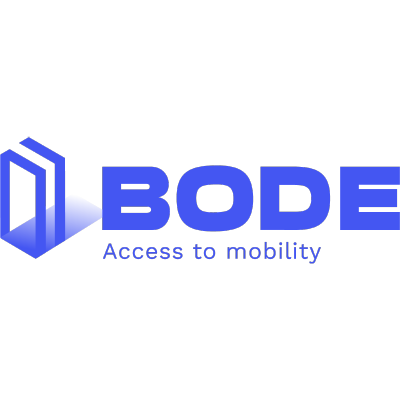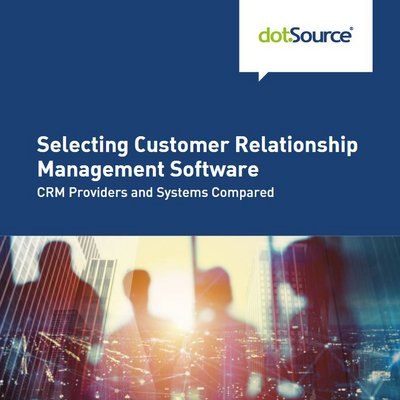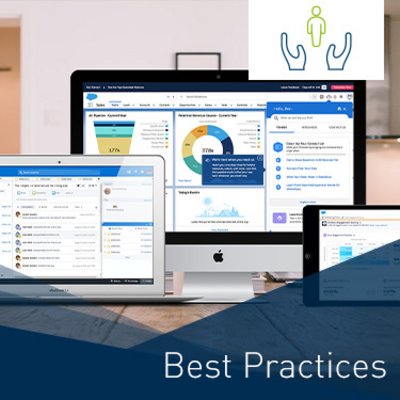
Your Benefits with dotSource as a CRM Agency
Benefit from a full-service partner that provides you with comprehensive support not only in the field of CRM, but also far beyond that – be it e-commerce, digital marketing or artificial intelligence (AI).
Our service portfolio ranges from the development of customer-centric strategies and the integration of complex IT systems to the optimisation of digital business processes.
Choose the CRM system that suits your requirements. We have long-standing partnerships with leading providers such as Salesforce, SAP, HubSpot and Microsoft.
This allows us to provide you with extensive advice on the strengths and special features of all the different providers and find the perfect solution for your needs.
Work with an agency that understands your requirements. We use our many years of experience in various industries to develop tailor-made solutions.
This strengthens customer relationships and gives you a competitive advantage.
Our Services as a CRM Agency at a Glance
Before the Project
- CRM Consulting: Analysis of your existing systems and processes for a clear definition of requirements
- CRM Strategy: Development of a customer-centric strategy based on persona and customer journey analysis
- Requirements Elicitation: Documentation of specific use cases and prioritisation of your goals
- System Selection: Compilation of a list of criteria and selection of the right CRM solution
During the Project
- CRM System Implementation: Introduction of the ideal system for your requirements
- Integration with Existing Systems: Seamless connection of the CRM system to your existing infrastructure
- Data Migration: Consolidation and transfer of your customer data to the new system, giving all departments a holistic view of your customers
After the Project
- Technical Support: Assurance of smooth operations through regular updates and maintenance
- Further Development: Implementation of additional features and long-term optimisation of your CRM strategy
- Operational Support: Support in daily business, for example creating campaigns and using engagement studios
- Training: Employee coaching to ensure effective use of the new system
CRM Is More Than Just Software: Benefit from CRM Strategy Consulting
A CRM solution is an important tool. To strengthen customer relationships in the long term, however, you need not only the right technology, but also a well-thought-out strategy that is geared towards your specific business goals.
As part of a CRM consulting session, we work with you to develop a tailor-made CRM strategy. We take your industry, your company size, your customer structure and your specific challenges into account.
A CRM consulting session includes the following aspects:
Comprehensive consulting session to understand your goals, challenges and processes
Identification of your archetypal customers (personas) and their needs, behaviour and expectations
Analysis of customers’ touchpoints with your company (customer journey) and identification of improvement potential
Mapping of processes that a CRM system can support
Development of a CRM strategy that helps optimise your processes, strengthens customer relationships and boosts your growth
Arrange a free initial consulting session now and let us develop a tailor-made CRM strategy together.
CRM Strategy Consulting for Your Project
Your Contact for Further Questions

Our Team Will Get Back to You Within One Working Day
- We will process your enquiry as quickly as possible and get in touch with you.
Other Agency Services in the Fields of CRM, Sales & Service
Opt for Modern CRM Solutions
Work with powerful tools to optimise the implementation of your CRM strategy. These systems enable you to provide efficient customer service and increase sales in the long term. Thanks to our agnostic approach, you can find exactly the right solution for your project. You can get an initial overview of the providers on the market and their positioning in the dotSource CRM vendor matrix.
Spotlight on Exciting CRM Projects
CRM Software: The Basis for Successful Customer Relationships
CRM encompasses the strategies, processes and technologies that companies use to manage customer relationships effectively.
The goal is to retain existing customers, acquire new ones and increase sales and customer satisfaction in the long term.
With a modern CRM solution, you have a central platform for managing customer data, optimising sales processes and supporting marketing campaigns.
It offers you a 360-degree view of your customers and enables data-driven decisions for a better customer experience.
Good Reasons for a CRM System
of consumers
expect companies to anticipate their needs. A CRM system helps meet these requirements through targeted analysis and proactive customer service.
of consumers
make their purchasing decisions dependent on the quality of customer service.
of companies
see efficient data management as a prerequisite for a successful personalised customer approach.
Benefits of a CRM System for Your Company
Automate time-consuming tasks such as data management, quoting and customer communication. This saves your teams valuable time and allows them to focus on strategically important activities.
Keep an eye on all customer data. Sales, marketing and service teams have access to up-to-date information at all times, which simplifies coordination and prevents duplication of work.
Create personalised experiences through targeted customer journey analysis. Tailor-made quotes and timely follow-ups strengthen customer loyalty and increase satisfaction.
Identify sales potential through comprehensive data analysis. Identify cross-selling and upselling opportunities to increase your sales.
Promote transparency and collaboration between your teams. CRM tools make it easier for marketing, sales and customer service to look after your customers holistically.
A CRM system grows with your company. Whether it is integrating new channels, entering new markets or managing larger volumes of customer data - a modern CRM adapts flexibly.
CRM and AI: Make the Most of Your Customer Data
AI is making CRM systems more powerful than ever before. It allows your sales team to work more efficiently and foster customer relationships more effectively.
Benefit from a wide range of features, including the following:
- Predictive Scoring: Focus on the most promising sales opportunities. AI not only evaluates leads based on current data, but also predicts their future potential.
- Next Best Action: AI analyses customer data and suggests the optimal next steps - be it a follow-up conversation, a suitable quote or a service check-in.
- Real-Time Data Analysis: Get up-to-date insights and make informed decisions in real time. This feature is particularly helpful for dynamic markets and time-critical sales decisions.
- Chatbots and Virtual Assistants: Take the pressure off your service team. Intelligent bots answer customer questions around the clock and prioritise support tickets.
- Automation of Repetitive Tasks: AI takes over time-consuming activities such as data management, appointment coordination and follow-up e-mails.
Learn More About CRM in Our Publications
Frequently Asked Questions About CRM
Why do companies need a CRM system?
A CRM system helps you manage your customer data centrally, providing the opportunity to improve customer relationships and automate processes. This in turn increases efficiency across sales, marketing and customer service while boosting customer satisfaction.
How do you select the right CRM system?
The choice depends on various factors such as company size, requirements and budget. Key decision criteria include scalability, integration with existing tools and usability. As a CRM agency, we support you in selecting the right system to meet your specific needs.
Why is a CRM strategy important?
Without a clear strategy, a CRM system often remains ineffective. A well-thought-out CRM strategy, combined with a strong understanding of your target audience, ensures structured processes, excellent customer engagement and maximum efficiency in sales.






















